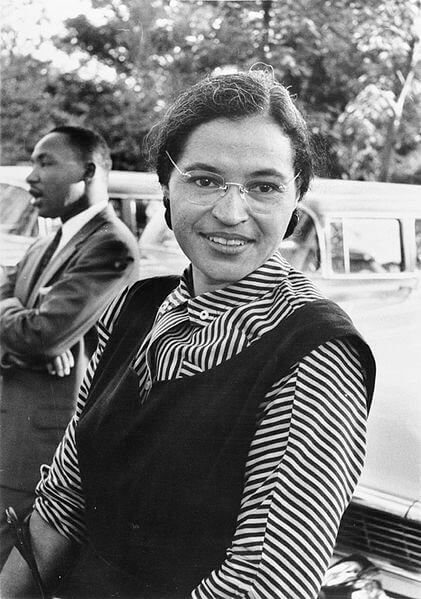
Rosa Parks was born February 4, 1913, died October 24, 2005. Her full name is Rosa Louise McCauley Parks. She is famous today for her civil rights activism, but mostly for being the black woman who refused to give up her seat on a city bus.
1. The famous bus ride
In Montgomery, Alabama, on December 1, 1955, Rosa Parks made history by being the black woman who refused to obey the driver of the bus when he gave her the order to give up her seat on the city bus to make room for a white passenger. Her actions sparked the Montgomery Bus Boycott, and made history. Her refusal became a key part of the modern movement for civil rights, and her actions sparked further action and set an example for many.
2. Work with Martin Luther King Jr.
Rosa Parks’ actions on that Montgomery bus gave her a legitimacy and made her an internationally recognized symbol of civil rights. Because of her prominent stance as a protestor of segregation based on race, she started interacting with and became a help to some of the other most famous civil rights activists, including Martin Luther King, Jr. Many of her actions helped him to gain a strong presence in the nation, and help keep the civil rights movement going forward.
3. Honors and awards
One of the reasons we still speak of Rosa Parks besides her role in the civil rights movement is because of the amount of recognitions and awards she received for the role that she played in the civil rights movement. She was highly honored for her part, in 1979 she won the Spingarn Medal; she won the Congressional Gold Medal; she is honored in a posthumous statue in the United States Capitol’s National Statuary Hall; and was given the posthumous honor of lying at the Capitol Rotunda.
4. Her stance
The reason Rosa Parks stance was so huge in the civil rights movement is because it challenged something many just took as a fundamental rule of society. During her time, there were rules that governed bus usage, some of which included that Blacks were to pay at the front of the bus, but must then get off the bus and walk to the back entrance to be seated. Blacks could not sit in the front of the bus, as the first four rows were reserved for white people. Blacks who sat in middle rows were required to give up their seat if a white person needed one. Rosa bucked the rules and did so on her own, changing the face of history.
5. Montgomery Bus Boycott
Parks sparked a revolution. Her refusal to give up her seat, and subsequent arrest for something so trivial, led to the Montgomery Bus Boycott. It was organized on her behalf, and announced at church and in the paper. The boycott was well organized, rallies formed, and many kept the boycott up until they got some of their demands.
The demands included: black drivers would be hired, seating in the middle of the bus would be handled on a first-come-first-serve basis, and the rules or laws governing bus riding be changed. The boycott went on for 381 days, and ended when the laws requiring segregation on public buses were lifted.
6. The MIA
The Montgomery Bus Boycott led to the formation of a new organization, the Montgomery Improvement Association. This formation was created to lead the boycott, and once of the first leaders was the to-date relatively unknown, Dr. Martin Luther King, Jr. So, Rosa Parks was the reason for the boycott, thus the formation of the MIA, and part of Martin Luther King, Jr. rise to fame.
7. International news
Parks’ actions were not something normal, and thus the whole situation was publicized, and brought international attention to the issue of racial discrimination. The US was not the only place where people were discriminated against because of color, and Rosa’s stand inspired boycotts in other parts of the world as well, including a bus boycott in the township of Alexandria, Eastern Cape of South Africa.
8. Browder versus Gayle
Rosa Parks was directly connected to this federal lawsuit that was used to change the state bus segregation laws. This is the suit that led to the laws being challenged, and eventually to segregation laws changing and being lifted.
9. Her sacrifice
Rosa Parks would not be well known today if her stand on the bus, and refusal to give up her seat had not lead to serious consequences and sacrifices for her and her family. As a result of her stand, Rosa was arrested, mistreated, lost her job, and became a public figure, constantly a person being either looked to for inspiration, or spat on to make an example of. Her husband also lost his job, and her family lost much of their privacy.
10. Her autobiography
Rosa Parks did not just inspire change during the civil rights movement, but through an autobiography she wrote in 1992, aimed at the youth today, she inspired many to stand up for their beliefs, and understand the difference one person can make.